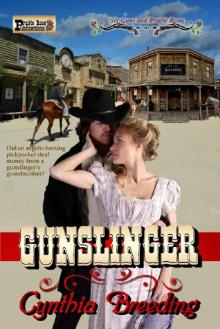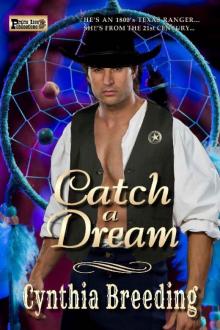- Home
- Cynthia Breeding
Sister of Rogues Page 3
Sister of Rogues Read online
Page 3
The runner took a step back and then held his ground. “We do not know, sir.”
“What do ye mean, ye doona ken? What did the rake say he did with her?”
“He did not say anything, sir. He could not. A wh…” The runner saw Mari in the hallway, “…a lady of the evening found him in a tenement. He’d been stabbed.”
“He is dead?” Mari asked in shock.
“He was unconscious when found and taken to the surgeon’s. I do not know if he yet lives.”
Fiona rattled the door once more, although she knew it was futile. She had been locked inside a bedchamber since earlier this afternoon. Muttering an oath she’d heard her brothers use many times, she contemplated her circumstances. The room was on the second floor, which would have allowed a fairly easy escape with the massive vines clinging to the stone walls outside, but both the window overlooking an inner court and the one on the outside wall had been nailed shut. Pity, since Fiona had spent her childhood climbing both trees and rickety ladders to hay lofts so she could eavesdrop on her unsuspecting brothers. Shimmying down the vines would be easy—if she could just get out.
The room was sparsely furnished with a wooden armoire along one wall and a small oak table upon which sat a tin water pitcher and basin. Neither item was strong enough to break the window’s glass. The brass chamber pot in the corner would work, except the window had small panes and she’d have to break the wood as well. The noise would be certain to bring Ada, the huge woman who called herself a matron, to the room before Fiona could crawl onto the ledge.
She sighed in frustration. She didn’t understand why Brice had been attacked—had he been badly hurt?—nor did she understand why she had been abducted or what she was doing in an asylum in Ireland.
Fiona walked to the window again and peered down into the enclosed courtyard and then up. Square towers rose on the corners of the massive stone walls around the court, each with merlots and embrasures indicating battlements. Assuming there were towers on the corners of the back wing she’d been locked in, it appeared she was in some sort of small castle.
She had always loved exploring castles and ruins, even though her brothers had told her such structures were often unsafe. This one seemed quite sturdy, although her safety was certainly in question. Why in the bloody—she’d learned that word from Jamie—hell was she here in the first place?
Damnation. This was pure madness—and she was not the lunatic.
A key turned and the door opened to reveal two young, red-haired maids, one carrying a bucket of water and the other a plate of food. Behind them stood the matron.
She pushed the maids inside and closed the door behind her. The girls both seemed nervous, glancing sideways at Fiona but not making eye contact as the taller, thin one put the plate of bread and cheese on the table and the shorter, plump one filled the pitcher. Then they scurried back to the safety of the door.
The matron pointed. “The master said you are to eat.”
Fiona looked up at her. “The master?”
“Mr. O’Reilly.”
In spite of her circumstances, Fiona felt a tingle travel down her spine. She was used to being around bonny, braw men—the Lord knew, women fairly swooned over her brothers and cousin—but something about Kier was different. Dressed totally in black, he was an imposing figure. Tall and broad-shouldered like her kin, his long hair as inky as Ian’s and his handsome face as chiseled as Jamie’s, he wore an invisible cloak of despondency, almost as though tragedy haunted him. Maybe that was only her imagination though—her brothers said she was given to flights of fancy—because she couldn’t tell what lay behind those piercing midnight-sapphire eyes. She had thought they were nearly black until the oil lamp on his desk earlier had caught the dark shade of blue. When she looked into Kier’s eyes, Fiona felt like she was falling into deep, dark water.
Ada must have noticed a change in her expression since the woman widened her stance. “Do not be gettin’ fancy ideas about him even though he fair coddles ye lunatics. After what that damn Englishwoman did, he’ll not be takin’ up with another.”
Aha. So there was something mysterious about Kier O’Reilly. Fiona’s natural inquisitiveness rose. What had the Englishwoman done? She was sorely tempted to ask, but knew she would get no information out of Ada. Fiona glanced at the maids, both of whom were still eyeing her with some trepidation. If she could win their trust, perhaps they’d share confidences about what had happened to the master…and maybe they’d even help her escape as well.
“What are your names?’
They were both startled and then looked at Ada who grimaced and pointed to the taller one. “That one is Erin. The other be Brena.”
“I am glad to meet you. Hopefully, we can be friends,” Fiona said.
Both girls widened their eyes and said nothing.
Fiona sighed. Perhaps friends had been too strong a word to use. They thought she was mad, after all.
“They will be seein’ to yer food and such,” Ada said.
“Am I to stay locked in this room? I thought Mr. O’Reilly said I would be able to have freedom inside the house.”
Ada sniffed. “He promises too much. The warden’s order is to allow an hour of exercise—with me supervising—a day. Ye might be allowed to take dinner in the dining room once I decide ye can follow the rules.”
“Rules?”
The matron crossed her arms. “There will be no screaming or shouting. No hitting or resisting, even when the surgeon comes to bleed ye—”
“Bleed me?” Fiona interrupted. “Why would he do that?”
“There will be no interrupting either,” Ada continued without answering her question. “Ye will not speak without permission.”
“But—”
“Silence!” Ada narrowed her eyes. “If ye do not obey, ye will be lashed.”
“Mr. O’Reilly allows beating?” Fiona asked, ignoring the command. Before she could move to defend herself, the matron moved with astonishing speed toward her and Fiona’s head snapped back with the impact of the woman’s slap. By the door, one of the maids gasped. Fiona put a hand to her stinging cheek, stunned. Never in her life had anyone raised a hand to her.
“Everyone knows lunatics must be beaten into submission,” Ada replied and then sneered. “The master does not see everything. That mark on yer face will disappear before morning. I leave no welts or bruises.”
Fiona looked past the matron to the maids, both of whom had gone pale. If she were not to have the freedom to move about the house, the maids were her only chance to get a message to Kier O’Reilly. She would have to be very careful, but she would succeed. She would succeed.
Somehow, Fiona must convince Kier she was not the one who was mad.
Kier descended the hidden passageway that led from his chamber to the northwestern tower that was off-limits to everyone and paused. His mother had died in this tower two years ago after withdrawing from the world when his father was killed at the battle of Vitoria. Kier remembered his mother keening and wailing in her chambers on the third floor of the tower. He had felt helpless in assuaging her grief since he was dealing with his own. His father had been conscripted into British service through the Militia Act and, although the Irish would have preferred to let England fight Napoleon on its own, the wages allowed the O’Reillys to pay their taxes and keep their home.
Having graduated from Trinity College, Kier had gone to Italy to try to secure funds for the Irish militia opposed to the Act of Union when his mother took her life. He had failed in the Italian endeavor and he had failed his mother as well.
Pressing a brass lever, Kier pushed against the wooden panel concealing the passage and stepped inside the ground floor of the tower. Servants insisted they heard his mother’s keening and wailing after her death, a superstition Kier didn’t bother to correct, even though he knew the cracked mortar in the old sto
ne allowed the wind to howl when storms blew through. When he’d said he wanted to leave the tower untouched, the staff was more than willing to stay away. And it served his purposes.
Taking a minute to let his eyes adjust to the twilight filtering through narrow arrow slits now paned over, Kier walked across the empty space that once had been the lady’s parlor but now only contained two chairs with faded brocade and a small table with a loose leg. He brushed his hand over the rough-hewn paneling underneath the stairwell, finding the lever that would open a small half-door beneath the steps. He bent to squeeze through the small opening and stood once inside. The room, simply furnished with a cot, desk and two chairs, was deceptively larger than it would appear from the parlor, but it had been intended to hide the lady of the house and her servants during the time when Norman knights fought Irish nobility. Most importantly, the alcove had a postern door well-hidden from the outside by a hedgerow.
That door swung open silently as Kier lit an oil torch and placed it in the sconce on the wall. Only one other person had a key—Finley O’Connell, who had recently returned from France with his cousin Daniel.
“You are right on time,” Kier said as Finley entered. He’d come by himself, as he usually did. The man’s skill was stealth, but he also wore black, making it easier for him to slip in and out of places unseen.
Finley nodded, removing the black cap from his ginger-coloured hair. “Timing is everything.”
“Were you successful then?” Kier asked, indicating Finley should sit and then pouring two drams of whiskey from the decanter he kept on the desk.
“’Tis hard to say. King Louis granted us an audience, but he was not overly receptive to the idea of providing either arms or funds for Irish independence.”
Kier raised a brow. “Irish independence? You did not put it to him as a matter of Catholic Emancipation?”
Finley shrugged. “We thought it better to leave religious bias out of the request, considering the Vatican is vying for its papal states back from France.”
“Ah. Yes, perhaps that was wise. What are Daniel’s next plans?”
“We will contact the Ribbonmen and start holding clandestine meetings to provide momentum for reestablishing the Irish Parliament.”
“An idea that King George thinks is pure lunacy.”
Finley grinned. “The king is one to talk, is he not?” He finished his whiskey and stood. “This is an opportune time for the Irish to organize. The prince regent cares more for social events—and the gluttony and debauchery that goes with them—than he does for politics. He cares little what happens outside the ton.”
“That is true,” Kier agreed. “Still, we must be careful, lest we be accused of treason.”
“It is a risk we must take if Irishmen are to have a voice again. I will be in touch,” Finley said and slipped out the door as silently as he had entered.
As Kier made his way back to the main portion of the house, he pondered on the vast discrepancies between the nobility and the working class. His own grandfather held the title of earl, which had been in their family since the sixteenth century, even though the title was near worthless now. Still, Kier had a sense of what it felt to belong to both the aristocracy and the common class. Worse, though, were the wretches who roamed the streets. Nobody—certain not royalty—cared one whit what happened to them. Many of them ended up in Houses of Industry, which were not much better than asylums.
Which brought his thoughts promptly around to his own predicament and to one very pretty lunatic he would be interviewing in the morning.
Chapter Three
Kier looked up from the papers strewn across his desk to the bedraggled spectacle of Fiona being pushed into his office the next morning and frowned. She was still wearing the begrimed, tattered dress from yesterday and her hair was a tangled mess. He had asked Ada to make sure hot water be taken to Fiona’s room and that she be given clean clothes. Obviously, that had not been done. His frown deepened when the matron closed the door and planted herself firmly in front of it.
“I do not think it will be necessary for you to stay.”
“Warden’s orders,” Ada answered and didn’t move.
Kier fought an urge to demand the woman get out, but he curbed his tongue. He needed the income from the asylum not only to pay taxes, but also the punitive tithing required of Irishmen to the damn English. Besides, the warden was the one he needed to do battle with and soon. The other three women who were inmates in his home were not particularly dangerous in his estimation, and far too many restrictions were being placed on them. The fiery beauty whose fae eyes had haunted him last night seemed much calmer this morn.
“Did you sleep well then?”
Fiona stared at him as though he had suddenly grown two heads. Kier winced inwardly. The question sounded inane, even to his ears. “I realize the circumstances regarding your arrival have been somewhat difficult—”
“Somewhat?” she interrupted. “I doona even ken how I got here.”
He looked down at the papers. The warden had listed amnesia as one of the symptoms her father had described. For Kier, there were a number of things, including Lady Jane Claire Litton that he’d rather forget, but he realized how frightening it must be for Fiona if she truly could not remember.
“Perhaps your memory will return as time progresses.”
“’Tis nae wrong with my memory.”
Not recognizing her problem was another symptom the warden had written down. “Understandable,” Kier said, “since you are grieving for your husband—”
“I told ye yesterday, I am nae married.”
Kier looked at his notes. “Your father said—”
“My father is dead.”
Perhaps her memory loss was worse than Kier thought. “Your father was here yesterday. Do you not remember?”
Fiona’s voice rose. “That man was nae my father.”
“I will take her back to her room and lock her in,” Ada said, moving forward. “Mr. Kelly says if a lunatic goes without food, her temper improves.”
“Mrs. MacLeod will not be denied food.”
Ada set her mouth. “Warden’s orders.”
“I will not have a person starving in my home,” Kier thundered, nearly losing his own temper. “By St. Patrick, have you no compassion?”
The matron sniffed. “They are lunatics.”
“They are also human.” His gaze went to Fiona’s face again and he quickly looked away before he got lost in her mesmerizing eyes. He should not feel such a strong attraction to her. For all her Scots accent—which the papers also noted she had practiced—she was still English. The Hanoverian kings were responsible for much of Ireland’s troubles. Hadn’t he already learned that lesson? No matter how beguiling Fiona might be, he would be wise to keep his distance, which was why he didn’t understand the next words coming out of his own mouth.
“I want the other women and Mrs. MacLeod to join me for dinner.” Ada started to protest, but Kier cut her short. “After the lady has had a bath and been given some clean clothes.”
The matron pursed her mouth. “She cannot be trusted. What if she wreaks havoc?”
“I will take responsibility,” Kier answered and turned back to Fiona. “Dinner will be at seven o’clock. Please use the remainder of the day to rest and ease your mind.”
“Help me to go home.”
Her voice, as soft as a lingering harp’s chord, was no less beseeching than her face. Damn it all. Was the woman part-fae after all?
Kier felt as though he were treading on very, very boggy ground.
Not only did Brena and Erin arrive with buckets of hot water a short time later, but the guard from the front door lugged a wooden hip-bath to Fiona’s room as well.
“Put it over there, Seamus,” Ada said, pointing to a corner, “and then be gone.”
He grunted so
mething unintelligible and slammed the door behind him. Ada positioned herself beside it, arms folded across her chest.
Fiona hesitated. She’d had maids assist her with bathing and dressing before, but somehow taking off her clothing—and she would have to take all of it off since even her chemise was filthy—in front of the matron was something she didn’t want to do. Fiona already felt vulnerable. Allowing Ada to see her naked was like giving her opportunity to decide which areas would bruise least.
“Are ye just going to stand there?” the matron scoffed. “’Tis just like a lunatic not to know the water is gettin’ cold.”
Fiona bit her lip to hold back her retort. Until she could figure out a way to fight back and win, she was only asking for more punishment. She turned to Erin, who looked a little less scared of her than Brena. “Would ye undo my laces please?”
As Erin stepped forward, a shriek rose from down the hall, followed by a loud, keening wail. “Hellfire and damnation!” Ada said, reaching for the door. “That fool thinks she’s seen another ghost again.”
Once Ada left, Fiona wasted no time in slipping out of her tattered clothes and stepping into the bath. She sat on the small wood perch inside, the tepid water barely covered half of her but it felt heavenly. Erin gave her a bar of what smelled like lye soap, but Fiona wasn’t going to complain about that either. Lord, she needed to feel clean.
She heard another shriek and then Ada shouting. Whatever was going on, it was keeping the matron busy. Fiona dunked her head, wishing she had real shampoo, but the soap would have to do. Quickly, she rinsed her hair and then stood. Brena handed her a towel, although she was quick to step back. Fiona thanked her and reached for the plain muslin gown lying on the bed. She slipped the dress over her head. It hung loose and shapeless since it had neither laces or buttons, but at least it was clean. As she finger combed her hair, she looked from one maid to the other. Both were watching her, but Fiona didn’t detect as much fear in their eyes.

 Gunslinger: A Six Guns and Prairie Roses Novel
Gunslinger: A Six Guns and Prairie Roses Novel Rogue of the Borders
Rogue of the Borders Sister of Rogues
Sister of Rogues Catch a Dream
Catch a Dream The Immortals II: Michael
The Immortals II: Michael Rogue of the High Seas
Rogue of the High Seas A Rake's Redemption
A Rake's Redemption My Noble Knight
My Noble Knight Rogue of the Highlands: Rogue, Book 1
Rogue of the Highlands: Rogue, Book 1 Rogue of the Isles
Rogue of the Isles The Immortals I_Lucas
The Immortals I_Lucas A Season for Love
A Season for Love The Immortals III: Gavin
The Immortals III: Gavin Rogue of the Moors
Rogue of the Moors